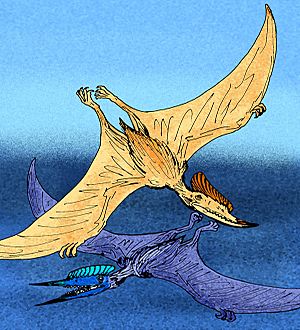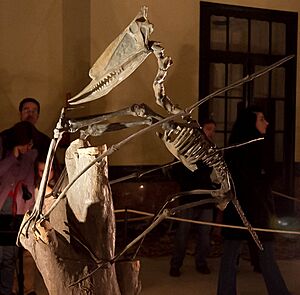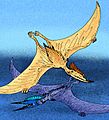Dsungaripterus facts for kids
Quick facts for kids DsungaripterusTemporal range: Lower Cretaceous
|
|
|---|---|
 |
|
| Dsungaripterus weii | |
| Scientific classification | |
| Kingdom: | |
| Phylum: | |
| Class: | |
| Order: | |
| Suborder: | |
| Family: |
Dsungaripteridae
|
| Genus: |
Dsungaripterus
Young, 1964
|
Dsungaripterus means "Wing of Junggar Basin." It was a type of flying reptile called a pterosaur. This amazing creature lived during the Lower Cretaceous period. It had a wingspan of about 10 feet (3 meters), which is like a small car!
Dsungaripterus had a special bony crest on its nose. It also had long, narrow, curved jaws that ended in a point. Scientists think this crest might have helped it steer when flying, like a rudder on a boat. Or, it could have been a way for Dsungaripterus to show off to others of its kind, perhaps to find a mate.
Contents
Meet Dsungaripterus: The Flying Tweezers!
The head and neck of Dsungaripterus were almost a meter long combined. Its most unusual feature was its unique jaws. They were long, narrow, and curved upwards, with a pointed tip. This made the animal look a bit like a giant pair of flying tweezers!
How Did Dsungaripterus Eat?
The front part of Dsungaripterus's jaws had no teeth. This smooth, pointed tip was probably perfect for reaching into cracks in rocks. It could also dig into sandy or muddy beaches. Scientists believe it used this part of its beak to pull out tasty shellfish and worms.
Further back in its jaws, Dsungaripterus had special teeth. These teeth were knobbly and flat. They were very strong and well-suited for crushing the hard shells of shellfish. This means Dsungaripterus was likely a skilled hunter of small sea creatures.
Images for kids
See also
 In Spanish: Dsungaripterus para niños
In Spanish: Dsungaripterus para niños
 | Madam C. J. Walker |
 | Janet Emerson Bashen |
 | Annie Turnbo Malone |
 | Maggie L. Walker |





